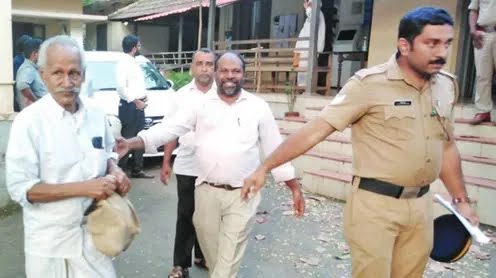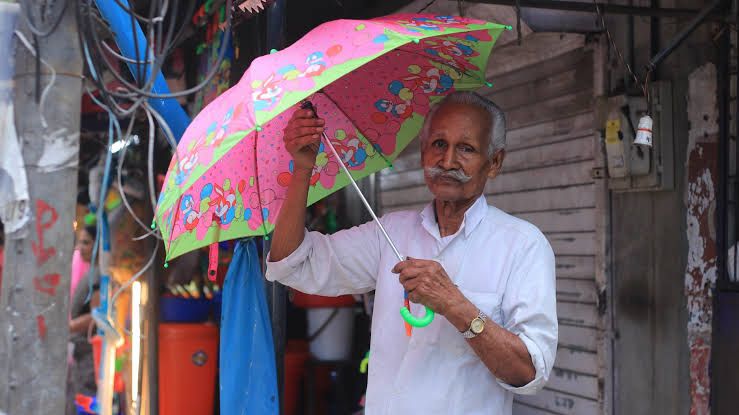Why is the Left Government Afraid of a 93-Year-Old Man?
The Kerala Police has arrested and jailed GROW Vasu, a 93-year-old activist who was protesting against the killing of two Maoist activists in Nilambur close to the State in a police encounter that happened 7 years ago. The incident described as the Nilambur encounter was criticised by a section of the media and social workers as extrajudicial killing. In November 2016, when GROW Vasu along with his co-activists held a demonstration in front of the mortuary of the Kozhikode Medical College where the bodies were kept, an arrest warrant was issued against him by the Kunnamangalam First Class Judicial Magistrate Court. It is by way of executing this long-standing warrant the police arrested GROW Vasu on July 29, 2023 on the charges of obstructing the police in the line of their duty and unlawful assembly. GROW Vasu has refused to apply for bail and was remanded and sent to Kozhikode sub jail for two weeks.
On November 24, 2016, the police shot dead Kuppu Devarajan and Ajitha (Kaveri) inside the Nilambur forest, in a place called Padukka forest which is part of the Karulai forest range. When their bodies were brought to the mortuary of Kozhikode Medical College, GROW Vasu and his co-activists staged a protest and demanded a judicial enquiry into the killings.
 GROW Vasu at Court
GROW Vasu at Court
GROW Vasu is known to the residents of Kozhikode town as a social activist who is always ready to intervene in issues affecting the marginalised and the voiceless. He has been living in the town for as many years as one could remember, in an old and dilapidated ‘peedika’, which in Malayalam means shop. Peedika is a cramped tiny room with a single archaic wooden door, flanked by similar shops _ a familiar site in Kerala. His conspicuous moustache, the Giant Malabar Squirrel that he befriended and lived with him and his bright smiling face remained a source of curious joy and lighter moments for journalists like me whenever we approached him for a comment on a case of human rights violation or social injustice. The photos of Karl Marx, Lenin, Ambedkar, and P. Krishnapillai adore the walls of his ‘residence’ along with the photos of the innumerable protest events that he had been part of. All that he ‘owns’ is an old television set, a table and a cot. His staunch and unwavering commitment to transforming society into a haven of justice is a source of inspiration for us.
He was a Naxalite once, to be precise, in the 1960s. He had participated in the Naxalite attack and killing of a feudal landlord by a group of Naxalites – an incident better known to Keralites as Thirunelli Naxalite Action- and was jailed for 7 years. Maoist literature and Radio Peking were their source of immediate motivation to attempt to bring about a Marxist-Maoist social order through violent means. The government led by C Achutha Menon crushed their attempted uprising and the leaders were sent to jail for many years. A few activists and some innocent people caught in the ideological crosswire lost their lives too. Though Kerala society saw this small group of young men who carried out these sporadic police station attacks as a bunch of unrealistic dreamers, who thought that the villages would rise up to engulf the cities and a just communist society would be established through an armed revolution, many members of that group later changed their course into democratic means of protest and action and made a significant imprint in society. GROW Vasu was one among them.
GROW, a Unique Union
In the 1980s, GROW Vasu became a staunch supporter and leader of the trade union struggle of the Gwalior Rayons Organisation of Workers (GROW), a union which, most probably for the first time in history, demanded the closure of the factory they worked in. The Mavoor Gwalior Rayons factory was manufacturing Rayon, a celluloid fibre that is made from bamboo. In 1958, the Birla Group and the Government of Kerala signed an agreement to establish this factory with a capacity to process 100 tonnes of pulp a day as the government saw this as an opportunity for industrial growth for the State; this was the largest industrial project in the state until then. The government even allowed the company to collect the raw material, bamboo, at a nominal price and with exclusive rights from the State’s forest lands.
 GROW Vasu speaking at an event
The factory was situated on the banks of river Chaliyar, the lifeline of many villages located on its banks. For the people of the village, the river is a source of not only drinking water but also livelihood in that they earned an income by selling the fish they caught and the mussels they collected from the river. No sooner than the factory started functioning, the effluents and clouds of smoke from the factory disrupted their lives and livelihoods. An abnormal rise in cases of cancer and respiratory diseases in the villages in the vicinity of the factory aggravated the situation leading to the villagers, and the civil society as a whole, demanding its closure. In this struggle that eventually led to the closure of this industrial unit, GROW Vasu led the factory workers. The moniker, GROW Vasu, stuck.
GROW Vasu speaking at an event
The factory was situated on the banks of river Chaliyar, the lifeline of many villages located on its banks. For the people of the village, the river is a source of not only drinking water but also livelihood in that they earned an income by selling the fish they caught and the mussels they collected from the river. No sooner than the factory started functioning, the effluents and clouds of smoke from the factory disrupted their lives and livelihoods. An abnormal rise in cases of cancer and respiratory diseases in the villages in the vicinity of the factory aggravated the situation leading to the villagers, and the civil society as a whole, demanding its closure. In this struggle that eventually led to the closure of this industrial unit, GROW Vasu led the factory workers. The moniker, GROW Vasu, stuck.
History of Encounter Killings
The modern history of encounter killings in Kerala began with the killing of Varghese, a Naxalite leader belonging to the same group of ‘revolutionaries’ as GROW Vasu. Varghese was shot dead by the police on February 18, 1970, in the Thirunelli jungle in Wayanad, another forest district of Kerala. Varghese was hugely popular among the poorest of the poor of that region. The shocking revelation that came from a police constable, Ramachandran Nair, many years later that he was commanded to shoot Varghese at point-blank range evoked a controversy and a series of debates on encounter killings. The case was reopened in the wake of the revelation and a police IG who ordered the killing of Varghese was sentenced by the CBI court.
Fast forward to 2016, and there began another series of police encounters with the Maoists. They did not have a big presence in Kerala and always lived on the fringes of the border forests, their contacts with the society limited to the tribal people living there. In many first-person accounts of tribal and local people recorded by Kerala’s TV channels, it became clear that the Maoists reportedly went to them just to get some rice and groceries.
The anti-extremist commando group of the police, The Kerala Thunderbolts, has been behind the recent encounter killings in Kerala. The simultaneity in the formation of the Thunderbolts and the encounter killings has raised many eyebrows in civil society. The question asked was: ‘Has the availability of huge financial support from the Centre to create and run such a commando group become a motivation in itself for the Kerala Police to continue such operations that were out of proportion to the extremist problem?’ Apart from the arrest of GROW Vasu’s arrest, a few more incidents have come as a shock to the civil society, including the 2019 killing of C. P. Jaleel, a Maoist leader, and the gunning down of 3 Maoists in the Attappady forest of Palakkad district. Though the Government of Kerala ordered probes into these encounters, the reports are yet to see the light of the day.
 GROW Vasu
GROW Vasu
Of late, GROW Vasu has been a micro-entrepreneur, with his hand-made umbrella brand, ‘Marivillu’ getting featured in local news. It was reported that he makes 20 umbrellas a day and this is not a hobby but his source of livelihood. No doubt that the nonagenarian will be at peace in his prison cell; the condition of his self-chosen dwelling is nothing better. The question is, why the Kerala government and police are losing their sleep over a 93-year-old who has long ceased to be a live wire years ago.








